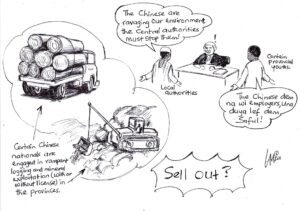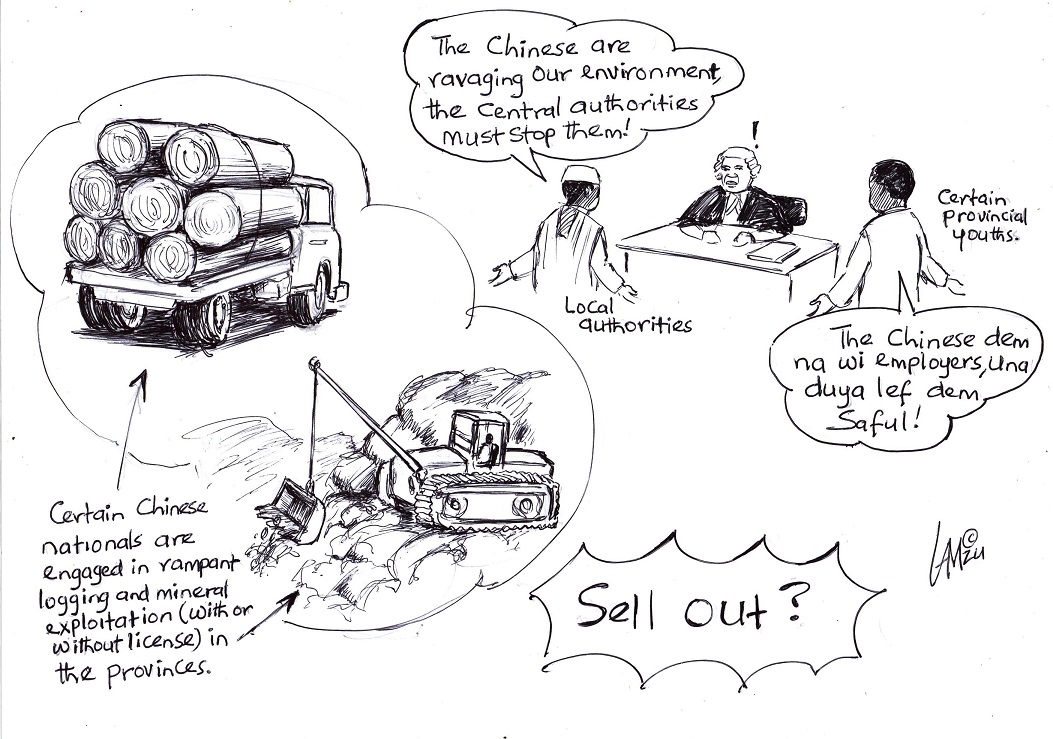Sierra Leone is attractive in terms of her mineral wealth and other resources, but the question about for who is it attractive still lingers.
Is it attractive for Sierra Leoneans or the Chinese?
If any well-enlightened Sierra Leonean is confronted with this question, he would not hesitate to choose the latter that says Sierra Leone is more attractive to the Chinese.
The Asian country gets the lion share of the mineral resources in this country. The Chinese got a foothold in Sierra Leone since the 1970s strictly for business and commerce and not the development of public institutions or governance.
Only the Americans and the British care for human rights, rule of law and democratic institutions for the peace and stability of the country. While the Americans and British are struggling to restore democracy, good governance, peace and stability, the Chinese are busy with business to make their economy back home thriving.
In collusion with the Sierra Leonean ‘Big Boys,’ Chinese factories are thriving back home with fuelled by Sierra Leone’s mineral wealth. It is anxiomatic that for any business entity, profit maximisation is an overriding objective, and the Chinese have always worked towards such aim throughout their years of sojourn in Sierra Leone.
In the form of bilateral relationship, Sierra Leone has played host to several Chinese companies in different sectors of the economy. The Chinese are dominant in the construction and extractive and transport industries without giving back to the country.
Most times, the Chinese have won several government agreements and contracts to fix the roads and extract the mineral wealth especially Iron Ore. China two years back recently enjoyed a 100 percent mining concession of the Iron Ore in PortLoko and Tonkolili districts after the closure of London Mining Company and African Minerals Limited owing to the twin shocks (the Ebola outbreak and the fall of Iron Ore Price at the World Market).
The closure of the two companies placed Sierra Leone into high vulnerability as she became a price taker. Government, at that time, was poised about putting an Ebola-ravaged economy back on track.
The Chinese readily answered the call and wasted no time in exploiting a position of vulnerability as the defunct Iron Ore miner, Shandong took over the mines but the country did not make much in terms of royalties.
The company came at a time the port and rail facilities had been constructed by the defunct Iron ore miners. A long and sturdy rail runs between Ferengbeya and Pepel towns in Tonkolili and PortLoko districts respectively in the North of Sierra Leone.

With such facilities, mining operation of the Chinese company was made easy but did not make the required contribution that would have brought a fundamental turning point to the country’s economy.
They also complained about not realising much from their exports, and they left not too long. Their vacuum was quickly filled by another Chinese company, Kingho which has also stayed for several years in the mining sector.
At some point, the Chinese company owed millions of Leones in royalties and even requested government to allow them to operate and pay later. Without any other option, Sierra Leone Government would accept whatever condition put forward by the company.
Making huge gains in the construction and mining industries, China has always been on the profit side while Sierra Leone permanently remains on the wrong end. It is often reported that Chinese companies here benefit from the rail and port more than any other company.
In several African countries, rail and port facilities are managed by companies who exploit and export ore to other countries and pay part of the money to government offers. In such a situation, the people benefit as government provide essential services to the people.
Chinese exploitation of Sierra Leone does not stop at the rail and ports but also several sectors of development which makes them visible everywhere in Sierra Leone.
They got the Toll Gate contracts which also brings several millions into Chinese pockets meaning a big boost to the Chinese economy.
The contract was about the expansion of the Masiaka-Freetown highway from two to four lanes. The move, according to government, was a way of easing transportation of the city-rural transport and to prevent road crashes.
The Chinese started collecting money even before the road was completed, and if it went as planned, the contract would last for 25 years.
What about the Black Johnson and National Stadium companies which have been awarded to the Chinese? Those contracts are sure to benefit China than Sierra Leone. Government knows very little what China is taking out of the Black Johnson waters.
Known for their over-arching business-mindedness in the form of debt diplomacy, the Chinese have done little to change the face of Sierra Leone’s economy as compared to good works done by other companies in faraway countries.


